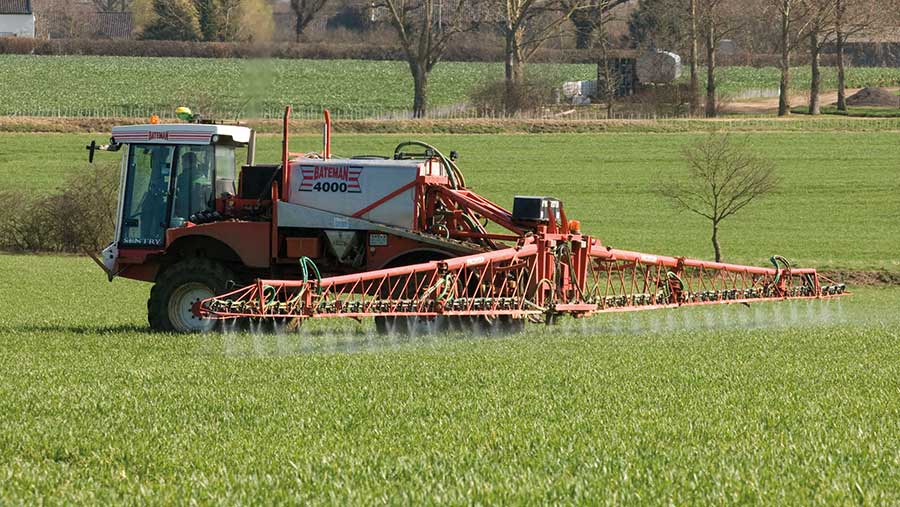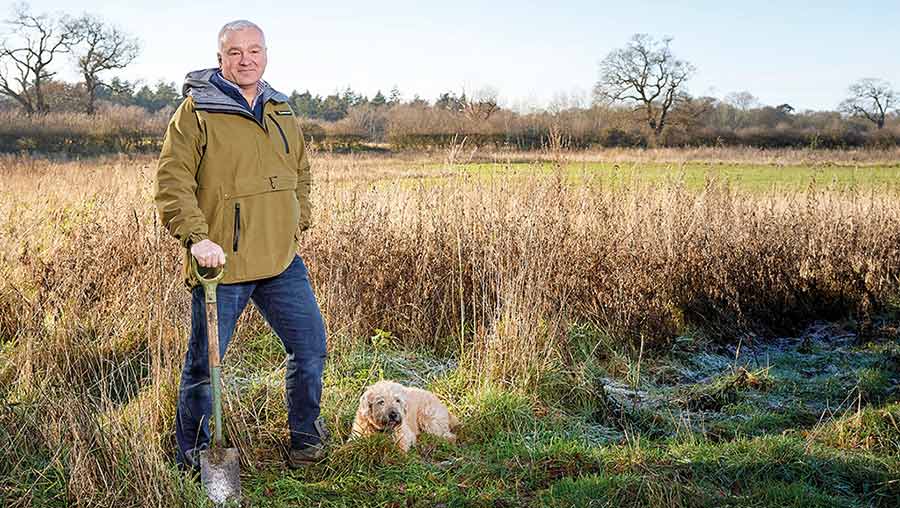What to expect from Defra’s sustainable pesticides action plan
 © Tim Scrivener
© Tim Scrivener A revised national action plan for pesticides must allow farmers continued access to effective tools to protect crops from pests, weeds and diseases so they can produce safe and affordable food for the nation, insist farm leaders.
Defra will publish its new five-year National Action Plan (NAP) for the Sustainable Use of Pesticides later this year, after considering the responses to a Citizen Space consultation that it ran for 12 weeks through to 26 February 2021.
See also: Why regulatory changes are needed for biopesticides
“The draft National Action Plan for the Sustainable Use of Pesticides sets out our ambition to further minimise the risks and impacts of pesticides to human health and the environment,” said a Defra spokesperson.
“We are currently considering the consultation responses to inform the final plan and ensure it has the right level of ambition.”
There were 1,564 responses to Defra’s consultation, seven email campaigns organised by NGOs, and just under 37,000 emails. Overall, 205 responses were identified as “campaign responses”.
Many responses focused on neonicotinoids and their potential effects on bees and pollinators, suggesting that Defra’s decision in 2021 to allow emergency authorisation of neonicotinoid-treated seed for sugar beet triggered a significant number of responses – although finally this was not actioned.
EU’s 50% reduction goal
The European Union (EU) has set a target to reduce the overall use and risk of chemical pesticides by 50% by 2030 under its Farm to Fork strategy.
Since the UK left the EU, pesticide regulations have been carried over into national law in Great Britain, and the UK government will take responsibility for its own decisions on the use of pesticides.
These decisions will continue to be based around careful scientific assessment of the risks, with the aim of achieving a high level of protection for people and the environment, Defra says.
Farmers Weekly understands that the objective of the NAP to reduce the impacts of pesticides will depend not only on the amount of chemical used, but also which pesticide is used and where the usage takes place.
The government will explore the role of setting ambitious pesticide reduction targets and support actions over the next five years to ensure these are met.
This will require balancing the views of pesticide users and related pesticide industries, including food, retail and manufacture, with environmental and public health groups.
IPM ‘at heart of plan’
The government’s 25-year Environment Plan puts Integrated Pest Management (IPM) at the heart of the future approach to crop protection on farms.
This will maximise the use of non-chemical control techniques and minimise the use of chemical pesticides.
Under its Environmental Land Management (ELM) programme, Defra will ask farmers in England to pilot an IPM standard to reduce reliance on pesticides as part of the Sustainable Farming Incentive (SFI), the first component of ELM.
The NFU ran a test and trial with growers on IPM throughout 2021, which was funded by Defra and delivered by researchers at Adas and Scotland’s Rural College (SRUC).
Dr Chris Hartfield, the NFU’s senior regulatory affairs adviser, said the NFU was “totally supportive” of increasing the levels of IPM uptake.
But he understood a lot of work was needed before Defra can roll out the IPM standard under the SFI before its proposed 2023 start date.
“It’s clear that many see doing more IPM as a potential risk and, to overcome that, you need to de-risk it with some sort of financial reward or incentive,” he added.
Evidence-based approach
Dr Hartfield said the NFU supported Defra’s draft NAP focus on reducing risks of pesticide use, but it was concerned it could drift towards just reducing pesticide use per se.
“Fundamentally, we want to see the government continue to take a risk- and evidence-based approach to the way it regulates pesticides,” he stressed.
“It’s right to focus on reducing risks associated with pesticide use both to human health and the environment. Reducing use is not an evidence-based way of working, and Defra knows this.”
In numbers: Plant Protection Products in the UK
- 20-40% drop in yields estimated without access to modern plant protection products (PPPs)
- 97% of UK farms use PPPs as part of an integrated pest management approach
- 40% rise in the cost of fruit and vegetables is estimated without pesticide usage
- £15 a week rise (£786 a year) on the average food bill for a family of four without PPPs
Source: CropLife UK
The NFU believes the current pesticide regulatory system, which the UK government has effectively inherited from the EU and cut and pasted into UK law, is already sufficiently protective, but is failing to enable productivity.
“There is no room for arbitrary approaches that tighten it further,” said Dr Hartfield.
“The result would be to create an uncompetitive position for UK growers and we would simply end up importing food from elsewhere produced using plant protection products (PPPs) we’re no longer able to use.”
‘Room for improvement’ on IPM
Dave Bench, chief executive of CropLife UK, formerly known as the Crop Protection Association, said many growers were already doing IPM to a good standard through changes such as crop diversification, as well as efforts to improve soil structure, soil biodiversity and soil organic matter levels.
“I think the baseline for IPM is quite good, but there is definitely room for improvement,” said Mr Bench. “It’s about getting them from ‘good’ to ‘best in class’.”
From a regulatory perspective, the EU is widely regarded as having the most precautionary regulatory system for PPPs in the world, Mr Bench noted.
He also fears that in the post-Brexit era the government may seek to add further restrictions on the tools available to farmers over the next five to 10 years, which do not apply to countries in the EU and globally.
“What you’re doing is making it more difficult for our farmers to grow food and easier for imports to come in,” he added.
Mr Bench said Defra clearly wanted to see much less use of PPPs and growers would also prefer not to use them unless necessary, because they were becoming more expensive.
But he warned it would be difficult to reduce pesticide use much further without reducing output.
“We need to consider things in the round to ensure farmers have the tools to grow food crops,” he said. “If we’re taking decisions in the UK and not allowing farmers to have these tools, that’s not happening elsewhere and over the water in the EU.”
Soil Association stance
Liz Bowles, associate director for farming and land use at the Soil Association, said farmers must be properly rewarded for reducing their reliance on pesticides, which should be seen as a “public good for society”.
“Critically, we want to see whole-farm approaches incentivised, so actions on pesticides should go hand in hand with action on nitrogen and soils,” she added.
Ms Bowles would like to see a target set for reduction of all chemicals, with outright bans for the most dangerous ones.
Alongside this, there must be much more focus on how best to produce crops without needing to use pesticides, which is now the subject of EU research.
“The impact of all this on UK crop production would be more resilient, profitable farms and, eventually, a greater diversity of produce that will meet the demand for healthy, diverse foods,” she said.
Case study: Nick Padwick, Wild Ken Hill estate, west Norfolk

A Norfolk farming estate has dramatically reduced its reliance on chemical inputs in a bid to grow more environmentally friendly food.
The plough has been put away at Ken Hill Farms near Snettisham, the fungicide programme has been reduced and growth regulators are no longer used. In addition, insecticides have not been used since 2011.
Wild Ken Hill estate is a 1,618ha farm that grows wheat, winter and spring barley, oilseed rape and sugar beet. Around 1,000ha has been put into a rewilding project.
Estate and farm director Nick Padwick said learning the government planned to reduce Basic payments prompted a rethink of the farming system.
“We wanted to be in a situation where we were not reliant on any inputs – not necessarily to go organic, but to build our biodiversity on the estate and do things in a more environmentally friendly way,” he added.
Mr Padwick said growing more nutritionally dense food with less impact on the environment, whether that’s burning less diesel or using fewer synthetic inputs, has challenged his lifelong perception that “all the answers come out of a bottle or a bag”.
In year one, when the farm stopped ploughing and cultivating, the estate saved around £23,000 in wearing machinery parts and £27,000 on fuel.
Crop yields have taken a slight reduction – for example, sugar beet yields were just shy of 70t/ha last year – but the gross margin is “less a than a conventional farmer with inputs”.
Last year, around 100 litres of Roundup (glyphosate) were applied across the estate and Mr Padwick wants to reduce the use of herbicides further.
The estate has also introduced a “pasture-cropping” system, growing strips of wheat within herbage leys. The trials have seen a massive reduction in the weed burden.
